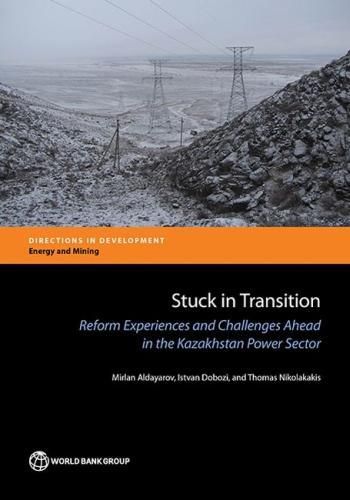Readings Newsletter
Become a Readings Member to make your shopping experience even easier.
Sign in or sign up for free!
You’re not far away from qualifying for FREE standard shipping within Australia
You’ve qualified for FREE standard shipping within Australia
The cart is loading…






The large-scale transformation of Kazakhstan’s power sector following independence in 1991 was reflected by the country’s move toward liberalizing the market and implementing sector regulation. As an early adopter of a liberalised multimarket model consisting of bilateral, spot, balancing, ancillary, and capacity submarkets Kazakhstan’s power sector was regarded a market reform leader among countries of the former Soviet Union, having achieved a much improved supply and demand balance and service quality. However, despite the noteworthy headway, sector reforms remain predominantly as unfinished business. The excess generation capacity that was inherited from the former Soviet Union at a time when the energy-only market prices were too low to attract serious investors has masked the need to reflect on the long-term outlook of the country’s power production. As the investment crunch unfolded in the mid-2000s, a diverging concern almost immediately arose; that is, the capacity additions of existing and planned generations may not be sufficient to keep pace with the perpetuating and significant increase in the demand for power. Instead of applying market mechanisms to allow prices to rise and reflect the underlying supply and demand gap, the GoK addressed the issue by implementing administrative, command-and-control measures. This study draws on the World Bank’s long-standing engagement in Kazakhstan’s energy sector and a number of recent technical assistance and advisory support activities. The study aims to (i) objectively identify the principal challenges faced by the Kazakhstan power sector in its ongoing transition and outlining potential policy options; and (ii) draw lessons from Kazakhstan’s experience in sector reforms for the broader international audience. The study covers broader sector issues including long-term least-cost power system planning, supply and demand balancing, tariff setting, market structure, and integration of renewable energy
$9.00 standard shipping within Australia
FREE standard shipping within Australia for orders over $100.00
Express & International shipping calculated at checkout
The large-scale transformation of Kazakhstan’s power sector following independence in 1991 was reflected by the country’s move toward liberalizing the market and implementing sector regulation. As an early adopter of a liberalised multimarket model consisting of bilateral, spot, balancing, ancillary, and capacity submarkets Kazakhstan’s power sector was regarded a market reform leader among countries of the former Soviet Union, having achieved a much improved supply and demand balance and service quality. However, despite the noteworthy headway, sector reforms remain predominantly as unfinished business. The excess generation capacity that was inherited from the former Soviet Union at a time when the energy-only market prices were too low to attract serious investors has masked the need to reflect on the long-term outlook of the country’s power production. As the investment crunch unfolded in the mid-2000s, a diverging concern almost immediately arose; that is, the capacity additions of existing and planned generations may not be sufficient to keep pace with the perpetuating and significant increase in the demand for power. Instead of applying market mechanisms to allow prices to rise and reflect the underlying supply and demand gap, the GoK addressed the issue by implementing administrative, command-and-control measures. This study draws on the World Bank’s long-standing engagement in Kazakhstan’s energy sector and a number of recent technical assistance and advisory support activities. The study aims to (i) objectively identify the principal challenges faced by the Kazakhstan power sector in its ongoing transition and outlining potential policy options; and (ii) draw lessons from Kazakhstan’s experience in sector reforms for the broader international audience. The study covers broader sector issues including long-term least-cost power system planning, supply and demand balancing, tariff setting, market structure, and integration of renewable energy